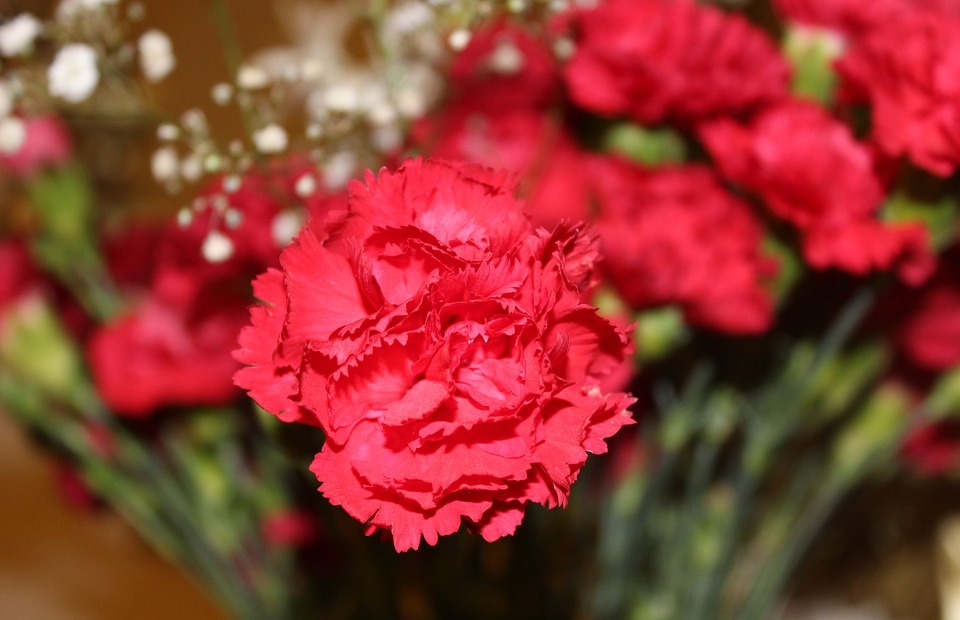This article will delve into the potential dangers of carnations for cats, examining their toxicity levels, the symptoms of poisoning, and the essential steps to take if your feline companion ingests these flowers. We will explore the different varieties of carnations and their respective toxicity levels, discuss the specific compounds responsible for poisoning, and outline the potential symptoms that can arise. Moreover, we'll provide detailed guidance on first aid and veterinary treatment options, while emphasizing the importance of prevention and offering safe alternatives to carnations for your home. Finally, we will address common questions regarding cats and carnations, providing comprehensive answers to ensure your peace of mind.
Part 1: Understanding the Toxicity of Carnations

1.1 Carnation Species and Toxicity Levels
Carnations (Dianthus caryophyllus), with their vibrant colours and delightful fragrance, are popular additions to floral arrangements. However, not all carnations are safe for cats. The most common types, standard and spray carnations, are generally considered mildly toxic to felines.
- Standard Carnations: These are the most widely known carnations, often featuring large, single blooms. While mildly toxic, they are usually safe in small amounts.
- Spray Carnations: These smaller, clustered carnations are similar in toxicity to standard carnations, posing a mild risk to cats.
- Carnation Stems: Notably, the stems of carnations contain higher concentrations of saponins, making them potentially more toxic than the petals.
1.2 Toxicity of Specific Carnation Varieties
While standard and spray carnations are generally considered mildly toxic, certain varieties, such as the carnation "Pink" and the carnation "White", have been associated with more severe reactions in cats. These varieties contain higher levels of saponins, potentially leading to more pronounced symptoms.
1.3 The Role of Saponins in Carnation Toxicity
The primary toxic compounds in carnations are saponins, a group of chemical compounds that contribute to the plant's bitter taste. These compounds can irritate the digestive system and cause various symptoms in cats. Saponins act as natural defence mechanisms for the plant, deterring herbivores from consuming them.
1.4 Factors Influencing Toxicity
The severity of carnation poisoning can vary depending on several factors, including:
- Amount consumed: Larger quantities of carnations, especially carnation stems, can lead to more severe symptoms.
- Cat's size: Smaller cats are more susceptible to toxicity from a given amount of carnation compared to larger cats.
- Cat's overall health: Cats with pre-existing health conditions may be more vulnerable to the effects of carnation poisoning.
Part 2: Symptoms of Carnation Poisoning in Cats

2.1 Mild Symptoms of Carnation Poisoning
- Gastrointestinal Upset: Vomiting, diarrhoea, and abdominal pain are common signs of mild carnation poisoning. The saponin compounds irritate the digestive tract, leading to these symptoms.
- Increased Salivation: Drooling or excessive saliva production, known as hypersalivation, can occur as a response to irritation in the mouth caused by saponin contact.
- Lethargy: Cats may become less energetic and more sluggish as a result of discomfort and digestive distress.
- Loss of Appetite: Cats may refuse to eat due to nausea or irritation caused by the carnation ingestion.
2.2 Severe Symptoms of Carnation Poisoning
In rare instances, carnation poisoning can lead to more serious complications:
- Respiratory Distress: Difficulty breathing or panting can occur if the saponin compounds irritate the respiratory system.
- Tremors and Seizures: Uncontrolled muscle movements or convulsions can indicate a severe reaction to the toxins.
- Coma: In extreme cases, loss of consciousness can occur due to the central nervous system being affected by the toxic compounds.
2.3 Timing of Symptoms After Carnation Ingestion
Symptoms of carnation poisoning typically appear within a few hours after ingestion. However, the onset of symptoms can vary depending on the factors mentioned previously, such as the amount consumed and the cat's individual sensitivity.
Part 3: First Aid and Veterinary Care

3.1 Immediate Action When Your Cat Ingests Carnations
If you suspect your cat has ingested carnations, prompt action is crucial:
- Remove the Carnations: Immediately remove any remaining carnations from your cat's reach to prevent further ingestion.
- Induce Vomiting: Consult your vet about inducing vomiting. While inducing vomiting can be beneficial in some cases, it should only be performed under veterinary guidance as it can be harmful in certain situations.
- Contact Your Vet: Regardless of the severity of symptoms, contact your vet immediately. They can assess your cat's condition and provide tailored advice.
3.2 Veterinary Treatment for Carnation Poisoning
Your vet may recommend the following treatments:
- Activated Charcoal: This substance can help absorb any remaining toxins in the digestive system, preventing further absorption into the bloodstream.
- Fluid Therapy: Intravenous fluids can be administered to rehydrate your cat and support their vital organs, particularly if they are experiencing dehydration due to vomiting or diarrhoea.
- Anti-Emetics: These medications can help prevent further vomiting and reduce discomfort.
- Pain Relief: Analgesics can be prescribed to alleviate pain and discomfort associated with gastrointestinal irritation.
Part 4: Prevention is Key: Keeping Your Cat Safe
4.1 Keeping Carnations Out of Reach: Safeguarding Your Cat
Preventing carnation ingestion is paramount for your cat's safety:
- Elevated Placement: Keep carnation arrangements on shelves or tables that are inaccessible to your cat.
- Enclosed Vases: Opt for vases with narrow openings that your cat cannot reach into, minimizing the risk of them accessing the flowers.
- Close Supervision: When carnations are present in your home, supervise your cat closely to ensure they don't attempt to nibble on them.
4.2 Safe Alternatives to Carnations: Choosing Cat-Friendly Flowers
Consider these safe and cat-friendly flower alternatives to avoid any potential risks:
- Roses: Many rose varieties are considered safe for cats, offering a beautiful and fragrant alternative.
- Sunflowers: These cheerful flowers are generally non-toxic to cats, providing a vibrant and cheerful addition to your home.
- Orchids: While some orchid species may contain mild irritants, most are considered safe for cats.
- Gerbera Daisies: These vibrant and long-lasting flowers are generally safe for feline companions.
- African Violets: These delicate plants are usually safe for cats, adding a touch of elegance to your home.
Part 5: FAQs
5.1 Are All Carnations Poisonous to Cats?
While most common carnation varieties are considered mildly toxic, the level of toxicity can vary. Certain varieties, such as "Pink" and "White" carnations, have been associated with more severe reactions.
5.2 How Much Carnation Is Toxic to a Cat?
The amount of carnation that can be toxic to a cat depends on factors like the cat's size, overall health, and the specific carnation variety consumed. Generally, larger quantities of carnation stems or petals are more likely to cause poisoning.
5.3 Can Carnations Cause Death in Cats?
In most cases, carnation poisoning is not fatal to cats. However, severe cases, particularly with large ingestions, can lead to complications that could potentially be life-threatening.
5.4 What if My Cat Just Nibbled on a Carnation?
If your cat has only nibbled on a small piece of carnation, it's less likely they will experience serious symptoms. Nonetheless, monitoring your cat closely for any signs of discomfort or illness is always recommended.
5.5 Can Carnations Be Toxic to Other Pets?
Carnations are generally considered mildly toxic to dogs as well. While they are less commonly associated with poisoning in dogs compared to cats, it's best to keep carnations out of reach of all pets.
5.6 Can Carnations Cause Skin Irritation?
While carnations aren't typically known for causing skin irritation, some cats may experience mild allergic reactions to the sap from the stems or petals. If you notice any skin redness or irritation, thoroughly wash the area with mild soap and water.
Everyone is watching
-

Are Cat Ribs Flexible? Understanding Their Anatomy
CATS & KITTENSThis article delves into the fascinating world of feline anatomy, exploring the flexibility of cat ribs and ho...
-

Can Cats Eat Bananas? (Everything You Need to Know)
CATS & KITTENSThis article dives into the intriguing question of whether cats can safely enjoy the sweet, yellow fruit, bana...
-

Cat Lifespan: How Long Do Cats Live?
CATS & KITTENSThis comprehensive guide explores the factors influencing the lifespan of our feline companions, providing ins...
-

Can Cats Get COVID-19? What You Need to Know
CATS & KITTENSThis article will delve into the fascinating world of feline COVID-19 susceptibility. We'll explore whether ca...
-

Can Cats Eat Eggs? A Complete Guide to Egg Safety for Your Feline Friend
CATS & KITTENSWhen it comes to treating our furry companions, we all want to ensure we're doing what's best for them. Eggs...
